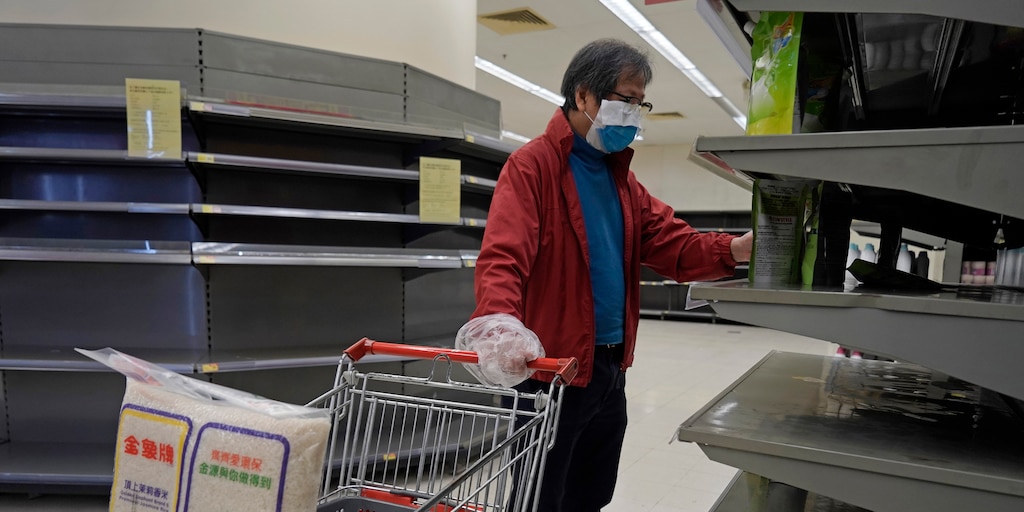 Associated Press
Associated Press
- The ongoing coronavirus outbreak could result in a dangerous and unique type of global economic recession.
- The outbreak has already crippled spending activity in China and prompted widespread factory shutdowns, harming both supply and demand in the economic superpower — and infecting economic operations worldwide.
- Central banks are normally well-positioned to boost demand through rate cuts. But the “supply shock” posed by coronavirus complicates matters considerably, according to Morgan Stanley.
- Visit the Business Insider homepage for more stories.
The fallout from the ongoing coronavirus outbreak is driving new warnings of a full-fledged global recession. And economists fear the downturn won’t resemble those in recent history.
The outbreak has already led companies to lower near-term revenue expectations and prompted analyst downgrades for global growth. The specter of economic contraction has rapidly descended on what many deemed a healthy expansion just one month ago.
Experts are now rushing to diagnose the total economic risk posed by coronavirus and pinpoint where it will first strike.
Past recessions came about after consumer spending drastically weakened, leaving companies with lower revenue and kicking off a dangerous cycle of job cuts, slowed purchase activity, and economic contraction. Supply and demand pressures can drive each other, placing central banks in the tough position of alleviating stresses before they compound.
What makes the coronavirus unique is that it’s arriving on both the supply and demand fronts. So-called “demand destruction” from China’s quarantine orders represents a serious near-term threat, Morgan Stanley analysts wrote in a Friday note, adding that consumer activity would sharply decline in the tourism, entertainment, and physical retail sectors.
Yet disruption to manufacturing activities “will have a much wider impact on the global economy via the spillover effects to global supply chains,” said the team led by Chetan Ahya, chief economist at Morgan Stanley.
Sorting through a “supply shock”
The latest economic data out of China suggest its supply woes are far from over. The country’s manufacturing purchasing managers index slipped to 35.7 in February from 50 the previous month, marking its lowest level since 2004. Manufacturing activity tanked to its lowest level on record, leaving firms with production concentrated in China with little hope for a bounce-back in supply.
A “supply shock” puts central banks in a thorny position as the epidemic intensifies. The Federal Reserve can lower its benchmark interest rate to encourage spending, but boosted buying activity does little to lift an economy when inventory is nowhere to be found, Ryan Avent, economics columnist for The Economist, wrote in a February 25 newsletter.
“It doesn’t matter how much newly printed money you put in people’s pockets if there are no stores open and no trucks to supply them anyway,” Avent wrote.
Still, markets continue to price in a 100% chance of a rate cut in March, according to the CME FedWatch Tool. Fed chief Jerome Powell echoed the speculation in a Friday statement, saying the central bank is open to a rate cut if the outbreak poses a serious enough threat. Goldman Sachs has even gone as far as to forecast a possible 50-basis-point cut from the Fed before its next meeting.
A successful vaccine could make a huge difference
While lower rates may bring a sigh of relief for some equity investors, a coronavirus vaccine is the “one element that could sustainably and effectively prop up sentiment,” Seema Shah, chief strategist at Principal Global Investors, wrote in a Thursday blog post.
Several biotech companies raced through February to bring successful vaccines and treatments to trial and enjoyed healthy gains in the process. A World Health Organization official said on February 24 that Gilead’s experimental treatment compound may be the best bet yet for combatting the outbreak, yet results from its human tests in China aren’t expected until April.
Until a medical solution is released, markets remain locked in a “highly uncertain game of ‘wait and see'” with recession risks growing around the world, Shah said.
The coronavirus has so far caused more than 3,000 deaths and infected more than 89,000 people. The virus’s infection rate in China has slowed in recent weeks, but new outbreaks in Iran, Italy, and South Korea threaten to morph coronavirus into a pandemic.
Now read more markets coverage from Markets Insider and Business Insider:













